
Zak Payne and Nathan Tenebaum have the pesonalities of born performers, and the rapport of dear friends.
The pair giggle and banter, Tenebaum speaking in his soft British accent, Payne in flat Arizona tone. Their real-life relationship closely mirrors that of their characters, James and Cameron, in the new season of their web series, Kissing Walls. The season just landed on YouTube and OpenTV.
Kissing Walls follows the lives of two gay men of color living in Chicago. James (played by Payne) aspires to write professionally. Cameron (played by Tenebaum) wants life on the wicked stage. Season 2 of the show finds the pair confronting the perils of career aspiration and dating in Chicago’s gay scene, touching on insecurities surrounding age, sex, race, and even polyamory. Amid the chaos, however, is a love story of a different kind–that of two best friends steadying each other as they take on the world. It’s a dynamic so many queer people can relate to.
Nervous but giddy, Payne and Tenebaum granted Queerty a few minutes to discuss the very funny new season.
How about we take this to the next level?
Our newsletter is like a refreshing cocktail (or mocktail) of LGBTQ+ entertainment and pop culture, served up with a side of eye-candy.
So Zak, what’s the inception of this series?
ZP: I was really interested in contributing to the media landscape, specifically with queer stories. It came about in that way. I was really inspired by series that were coming out at the time. Web series like High Maintainance, and The Outs, Broad City, Awkward Black Girl–there were possibilities for independent television. Nathan was the first person I contacted. We’d met in Arizona and worked together on a few productions: Rent, Hairspray. I’d seen him in everything I’d done, and he was blowing up in Arizona theatre.
I started writing. We did a Kickstarter and realized I wasn’t going to get the money I thought I could. The script was originally much longer and had an ensemble cast. Once that wasn’t an option, we started thinking more intimate. I always wanted to do a series that was more real, to show queer characters of color…
NT: In a non-apologetic way.
ZP: Yeah.
NT: We had to introduce someone to something that we consider our everyday sense of life. I always feel like gay characters have to be introduced or hand-held through a story as a friend to someone who is more palatable to the sensitivities of what people want to see on TV. We didn’t want to do that. We wanted to present what we are: human beings.
Well said. So, Nathaniel, Zak mentioned you were working in Arizona. Did you relocate for the show?
NT: Well, correct me if I’m wrong Zak, but I had gotten to a point in Arizona where I was like this is dull, I can’t stand it any longer. I was like we should go somewhere. We should go to Chicago! And then I totally aborted the plan because my theatre career in Arizona took off.
ZP: Chicago was definitely not on my radar. I thought I would go to LA, I was done with Arizona. Then we went with a friend group to Chicago, and I totally saw myself living here. I was still going to Arizona University, but I decided to finish classes online.
NT: But in answer to your question, each time we did a shoot I did relocate. And I did turn down gigs to do this.

Did you have apprehensions about doing a web series?
NT: The funny thing is Zak was just gushing about stuff I’ve done. But Zak, during the time we did Rent, Zak made an entire feature-length documentary about the process. And it was compelling. It’s really spectacular. To make a long story short, I didn’t have any apprehension whatsoever.
I’m glad you mention Chicago. Chicago is very prominent this season, with some beautiful photography. What is it about Chicago that lends itself to this story, and that makes it unique for gay male dating?
ZP: I think I’d lived in Chicago about a year before I decided I was going to get going with making something. I contacted Nathan.
NT: What was conceived [prior to moving] was that it was going to be for him and I.
ZP: Yeah. I had come from Arizona, a very conservative state. It’s a completely different culture coming to Chicago. There are so many little pockets of the queer community. I think the largest is Boystown [in Wriglyville]. That drew me in, and was exciting. In Arizona, the biggest event would be Pride. In Chicago, there’s something for everyone in the community, which excited me. I never feel like I don’t belong. I’ve always felt very welcome here.
And for you Nathan?
NT: For me, I don’t look at it necessarily through a queer lens. It’s more when I got to Chicago, it was an immediate sense of being in a cozy pocket. Everything was accessible, easy to get to. The city itself really immediately transports you to this really comfortable feeling. The appeal of that is something I always look for when I’m ingesting media: I’m looking for a feeling to feel like I can settle down, to take a moment. Chicago, as soon as I set foot in it, I exhaled. So when Zak mentioned we would shoot in Chicago, I was like this is a feeling that will translate.
You touch on a lot of major dating issues this season: open relationships, racism, ageism, meeting guys on apps and the like, and how friendship can help keep you anchored in the midst of all that pressure and moral dilemma. Is that reflective of your own relationship?
ZK: That became such an important element of the show as we were developing, and especially between production of Season 1 and Season 2. [We realized] that’s where the magic is in the series, within our friendship. So that was something we had to have amplified more in Season 2. Especially in the romantic comedy genre that I was really attracted to, the friendships more than the boy-girl relationships. I liked the friend scenes.
The other thing that I love about your approach to that is how the insecurity of the characters doesn’t absolve them. How much of that is based on your real insecurity?
NT: The insecurities playing out on screen are my current anxieties. They always say write what you know, so Zak and I chatted about it, and I really opened up for him. During Season 2 I had just gotten out of a five-year relationship which had just ended six days before we started shooting.

Oh wow.
NT: So everything was very raw, very fresh, very new. Zak asked me if it was ok to tap into, and I said yes. So there is no separation for me.
ZP: From the very beginning we were very ever really wanted to make up drama. I can just talk day-to-day about what’s going on in my life, and I’ll have five friends who are like “Me too!” And I was like why are we making up these scenarios? I can just go through any day-to-day life and just find the drama in it. That, from day one, was what we were really tapping into.
NT: In those moments drawing a direct parallel from our real lives…people sometimes struggle with writing to make sure it’s authentic and very real. We eliminate having to ask ourselves that question when we are doing a translation from our actual lives. It will always be real. The performances will always have a grounded base in the stories that we’re telling. They’re lived experiences.
Does that make the show a greater challenge for you as actors—going back to confront your own pain?
NT: Yeah. Absolutely.
[Laughter]
NT: In Season 2, there is a scene where Benjamin comes over to meet James, and they immediately start f*cking. It’s rough, because I was just coming off of a relationship, and my ex and Peter were like similar heights and hairstyles. It was all very oh my God it’s happening again!
[Laughter]
NT: Zak was so sweet about it. He pulled me aside and asked “How are you feeling? Do you need to take a moment? Tell me what you need to get through this moment.” He was really accommodating which allowed me to feel safe and really jump into those moments. I felt I had a responsibility as an actor. If I was seeing a situation that was so traumatic for me being replayed, I would want that situation to be authentic. I want to feel its something I can relate to and not something thrown out there for drama. Something I can directly relate to.
ZP: I think that was something from the scale we’re at. We didn’t have a lot of interference from a major studio telling us “Tone this down, bring this up.” It was very much just a stage for discovery. It’s like, I’m not Shakespeare. If you have something better to say, say it. We have rehearsal to figure out what worked and what didn’t. There was always this striving for something authentic and real. We never wanted a series that felt very Hollywood. We’re able to make something different, so why not?
Talking to you both now, it’s obvious this is a very fulfilling creative experience for you.
ZP: It’s a privilege.
It’s also ironic. Creative frustration also plays a huge role this season.
ZP: Yes.

Does reliving these feelings help you find a certain catharsis?
ZP: I think I’m living in that right now, this week, now that it’s out. Looking at the last two years of post-production and editing, I’m still very much connected to these characters and their artistic shortcomings and anxieties. I think only now, having it out, and hearing people say “This is really good” am I like this is cool.
NT: It feels good, because I’m always having this internal conflict of are we straying away from what’s really happening? Did we sensationalize it? Then something will happen and it’s like no, this is as weird as our life has been. And I mean weird in the best possible way: unexpected, kismet, just really exciting. And I do think there’s catharsis that comes through that. I love fruit punch in any way, shape or form. Doing the series and being reminded that we are living these lives we portray feels like a fountain of fruit punch in the house. I’m creating content for something that I know will be authentic. That is cathartic. I don’t know many artists that arrive at that on their first go. It’s an unbelievable privilege.
The show isn’t afraid to address sex, and, shall we say, some of the logistical issues associated with gay sex. But it doesn’t dwell on that, and it never feels like softcore porn. That’s a trap many web series fall into. How do you strike a balance of a frank approach without being exploitative?
ZP: We always have the story first. With the writing process, I was never like this is where I put in the sexy scene. It was always these are the characters, this is the drama. If we’re going to show these characters than we need to show their sex lives. I always go back to the romantic comedy genre and the gay best friend trope. They’re usually sexless characters. If our whole thesis is taking those characters and putting them at the forefront of the romantic comedy, then they should be having as much sex as their straight, white counterparts in the genre.
NT: And if you do put two white ingenues in a film, and you’re 40 minutes into the film and there isn’t a love interest story starting, people would riot. Why have beautiful attractive people in this movie for 50 minutes? Where’s the tension? People don’t do that when it’s two dudes, because it’s like people don’t want to say that. It’s unbelievable. And the easiest way to make those scenes to come across real, when you really break it down, what takes a concept from being completely hyperbolic and unreal is the fact that there are eyes and ears that can relate to it. That’s what takes a moment from being fanciful to realistic. When you get people that can relate to it, it becomes real and it’s immediately appealing.
ZP: You know, the whole big sh*t in the bed fiasco [one character this season loses bowel control during sex]…[could have been] this whole big thing. And I have seen a few things like that. But [as a gay man] you have these situations, and things go awry, and you just have to glaze over them like an adult. We show that with the series. So it just ends up being, rather than this traumatic scene, it’s like oh, it’s actually totally fine.
NT: And loving. Those moments happen. We want to inspire people to not leave their house to go on their first gay date terrified of sh*tting on someone. It happens.
[Laughter]
I encourage douching.
NT: For sure.

Now let me ask you both: as queer men of color…I think all queer people recognize there is a double standard in the way gay sex is portrayed on screen versus the way straight sex is portrayed. Do you see there as being a double standard in the way sex is treated with the white ingenues you mentioned versus people of color?
NT: I definitely think there has been a situation like that. If we’re taking it back to the trope of slavery, we were just around to be studs. We were just seen as a means to get someone else off. That trope carries itself down. Yes, it’s been watered down over hundreds of years, but it’s hypersexualized for people of color. It’s an easier sip into romance for characters if they are just not black men or men of color. This is what Zak has done so beautifully: he really created this world where romance can exist outside stereotypes. What if you drop two people of color into When Harry Met Sally? What happens then? And why not?
That’s a good working relationship. Has appearing in a web series opened more doors for the two of you to find work as actors?
ZP: It’s starting. Season 2 has been out a week, so it’s still in its infancy. But just doing Season 1 I was of the mindset that if we can just make something we can get on to the next thing. And I think that’s exactly what happened in finding our producer for Season 2. He was able to see the possibilities. Now, with Season 2 out, I wan to anticipate another big leap. There’s so much more we can do with Season 3.
What about for you as an actor, Nathan? Have you had more offers?
NT: No. But this is my first on-film project ever. I’m predominantly a stage actor. That’s where my career began. But doing this project has definitely inspired me something within me too. I’m hoping to jump in a little bit more.
What are your hopes for Season 3?
NT: We’re working on it.
ZP: We’re definitely working out it. We have quite a few ideas, and want to dive into half-hour episodes. That will take quite a few resources, and that’s the road we’re on now. I have a date in my head, so I’m like we shoot on this date. And the last two times it worked, so I’m hoping it will be the case again.
Kissing Walls is available on YouTube and OpenTV. All photos courtesy of Jon Wes and ‘Kissing Walls.’




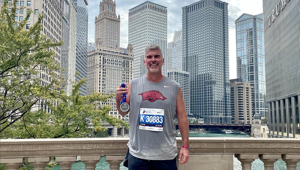
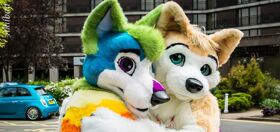

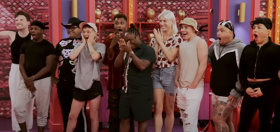


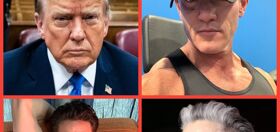



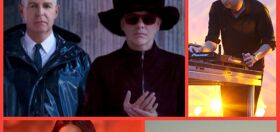






Rex Huskey
who are these people?
MISTERJETT
if you read the piece, you wouldn’t have to ask.
supernaut
If anyone knows the name of the song and the artist in the trailer music, please let me know. Thank you so much.
Chrisk
umm…owen duff.